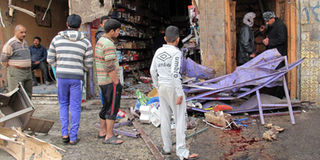Breaking News: Old Kijabe dam tragedy: Death toll rises to 45
Blasts kill 57 as Iraq hit by political crisis

Iraqis inspect the damage after a wave of attacks in Baghdad killed at least 57 people on Thursday. PHOTO/AFP
What you need to know:
- Parliament calls urgent meeting of political leaders for Friday, the Muslim day of prayer
BAGHDAD, Thursday
A wave of attacks in Baghdad on Thursday killed 57 people as Iraq faced a political crisis, with its vice president accused of running death squads and the premier warning he could break off power-sharing.
The apparently coordinated blasts in the capital and the slaughter of a family-of-five in restive Diyala province were the first major sign of violence in a row that has threatened Iraq’s fragile political truce and heightened sectarian tensions just days after US forces completed their withdrawal.
Prime Minister Nuri al-Maliki vowed that the bombers would not be allowed to have any impact on the political process, while parliament speaker Osama al-Nujaifi condemned attacks, which he said “threaten national unity.”
“The timing of these crimes and their locations confirm once again to any doubters the political nature of the goals that those criminals want to achieve,” Mr Maliki said in a statement.
“The criminals and those who stand behind them will not succeed in changing events or the political process, or in escaping punishment.”
Parliament called an urgent meeting of political leaders for Friday, the Muslim day of prayer and rest. The UN special envoy to Baghdad Martin Kobler slammed the “horrendous” attacks, and said Iraq’s leaders must “act swiftly, responsibly and in unity”. The Baghdad attacks, the deadliest in more than four months, mostly targeted Shiite neighbourhoods and coincided with the morning rush hour. Security forces quickly cordoned off bomb sites, AFP correspondents and officials said.
Health ministry spokesman Ziad Tariq put the toll at 57 dead and 176 wounded in 10 attacks. An interior ministry official, speaking on condition of anonymity, said 63 people were killed and 185 wounded.
Helicopters could be heard hovering overhead at many of the blast sites and emergency response vehicles rushed to the scene of attacks, while tightened security at checkpoints worsened Baghdad’s already choking traffic.
“They didn’t target any vital institutions or security positions,” Baghdad security spokesman Major General Qassim Atta told AFP. “They targeted children’s schools, day workers, the anti-corruption agency.”
Atta, who said there had been a dozen attacks aross the city, said it was “too early to say” who was behind the violence.
The attacks struck in the Allawi, Bab al-Muatham and Karrada districts of central Baghdad, the Adhamiyah, Shuala and Shaab neighbourhoods in the north, Jadriyah in the east, Ghazaliyah in the west and Al-Amil and Dura in the south, the officials said.
A family of five — parents, their two daughters and a son — were gunned down by insurgents in a suburb of the Diyala provincial capital Baquba, north of Baghdad, early on Thursday, medical and security officials said.
The father and son were both members of the anti-Qaeda Sunni tribal militia known as the Sahwa which sided with the US military from late-2006, helping to turn the tide of the insurgency.
Thursday’s violence was the worst since August 15, when 74 people were killed and more than 200 wounded in a series of attacks across 17 Iraqi cities.
The attacks come with Iraqi politicians at loggerheads over a warrant issued for the arrest of Vice President Tareq al-Hashemi, with Maliki demanding that Kurdish authorities hand over the Sunni Arab leader, who is holed up in their autonomous region. Hashemi denies the charges.
Maliki has also called for his Sunni deputy Saleh al-Mutlak, who belongs to the same Iraqiya bloc as Hashemi, to be sacked after he described the Shiite-led government as a “dictatorship”.
Iraqiya, meanwhile, has boycotted parliament and the cabinet, and Maliki has threatened to replace their ministers in the year-old unity government.
Washington has urged calm, with the crisis coming just days after US troops completed their withdrawal, leaving behind what President Barack Obama had described as a “sovereign, stable, and self-reliant Iraq.”
At a news conference in Baghdad on Wednesday, Maliki called for Kurdish officials to transfer Hashemi, and warned Iraqiya that he would replace its nine cabinet ministers if they continued to boycott government sessions.
Hashemi denied the terror charges against him after the warrant was issued for his arrest on Monday, and insisted he is willing to stand trial on condition that it be held in the autonomous Kurdish region.
Maliki and other leaders have called for talks to resolve the crisis, but the premier’s spokesman told AFP he would not accept any mediation over the charges against Hashemi.
Violence is down from its peak in Iraq in 2006 and 2007, but attacks remain common. A total of 187 people were killed in violence in November, according to official figures.
(AFP)




